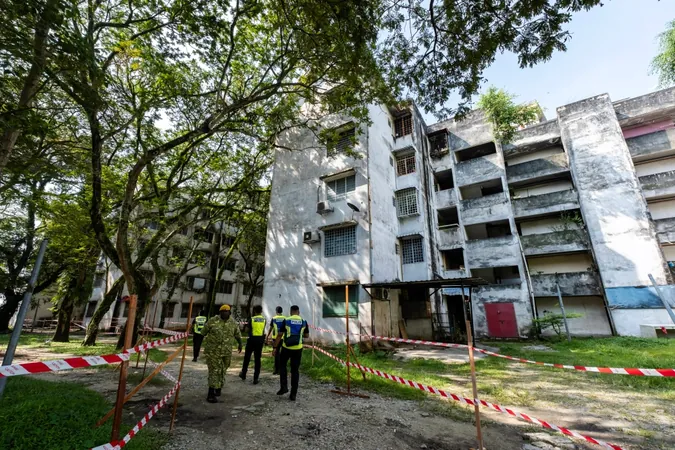
Urban Renewal Act: Malaysia's Urgent Call for Change in Aging Neighborhoods
2025-09-01
Author: Jia
Urgent Need for Urban Renewal in Malaysia
As Malaysia's cities transform, it faces a pressing challenge: the crumbling infrastructure of its aging buildings. Housing and Local Government Minister Nga Kor Ming emphasizes that the time to act is now. "Many housing estates were constructed in the 1960s and 70s, and after over 50 years, they're far from safe or efficient," he remarked in a recent media briefing.
Understanding Urban Renewal
Urban renewal isn’t just a fresh coat of paint on old structures; it’s a comprehensive approach that includes refurbishment, reconstruction, and improved planning aimed at enhancing property and public spaces. Nga emphasizes the importance of upgrading living standards: "It’s about ensuring safety and creating sustainable communities, not merely replacing old flats. "
Why Action is Imperative Now
Using the Desa Bakti flats in Selayang as a stark example, Nga notes, "That building is just 30 years old yet looks abandoned." He argues that the issue at hand transcends political debates, calling for a united front to address the decline.
Mapping the Renewal Landscape
Currently, there are 534 sites earmarked for urban renewal across Malaysia, with state governments having already identified these areas, including regions led by Perikatan Nasional. Despite their initial support, some state officials now oppose these initiatives, raising questions about fairness.
Three Pillars of Urban Renewal: Revitalize, Regenerate, Redevelop
The proposed Urban Renewal Act (URA) comprises three facets: revitalization—repairing essential amenities like lifts; regeneration—enhancing environments with green spaces and community facilities; and redevelopment—rebuilding unsafe structures. Nga posed a poignant question: "Do we really want residents climbing 30 flights of stairs without a lift?"
Empowering Residents in the Renewal Process
Unlike previous governance, which often sidelined citizen input, the new framework aims to protect homeowners' rights. The Razak Mansion redevelopment serves as a cautionary tale, showcasing how residents were bullied into compliance. This time, 80% consensus from residents will be required for redevelopment, ensuring their voices are integral to the process.
A Fairer Path Forward
Current laws demand unanimous approval for redevelopment, allowing a single dissenting homeowner to halt a project supported by the majority. Nga points out the injustices this creates, referencing the deserted Desa Kuda Lari in Kuala Lumpur, left abandoned for eight years because of one individual. The new law aims to rectify this imbalance.
Maintaining Community Integrity
Despite fears that the Urban Renewal Act will displace residents, Minister Nga reassures the public: "Residents will remain in their neighborhoods unless they choose otherwise." The law protects various types of land and mandates a staged project approach to safeguard community integrity.
In summary, the Urban Renewal Act holds the promise of not only upgrading Malaysia's aging infrastructure but also empowering its residents, ensuring their voices are heard as the nation steps into a more sustainable future.

 Brasil (PT)
Brasil (PT)
 Canada (EN)
Canada (EN)
 Chile (ES)
Chile (ES)
 Česko (CS)
Česko (CS)
 대한민국 (KO)
대한민국 (KO)
 España (ES)
España (ES)
 France (FR)
France (FR)
 Hong Kong (EN)
Hong Kong (EN)
 Italia (IT)
Italia (IT)
 日本 (JA)
日本 (JA)
 Magyarország (HU)
Magyarország (HU)
 Norge (NO)
Norge (NO)
 Polska (PL)
Polska (PL)
 Schweiz (DE)
Schweiz (DE)
 Singapore (EN)
Singapore (EN)
 Sverige (SV)
Sverige (SV)
 Suomi (FI)
Suomi (FI)
 Türkiye (TR)
Türkiye (TR)
 الإمارات العربية المتحدة (AR)
الإمارات العربية المتحدة (AR)